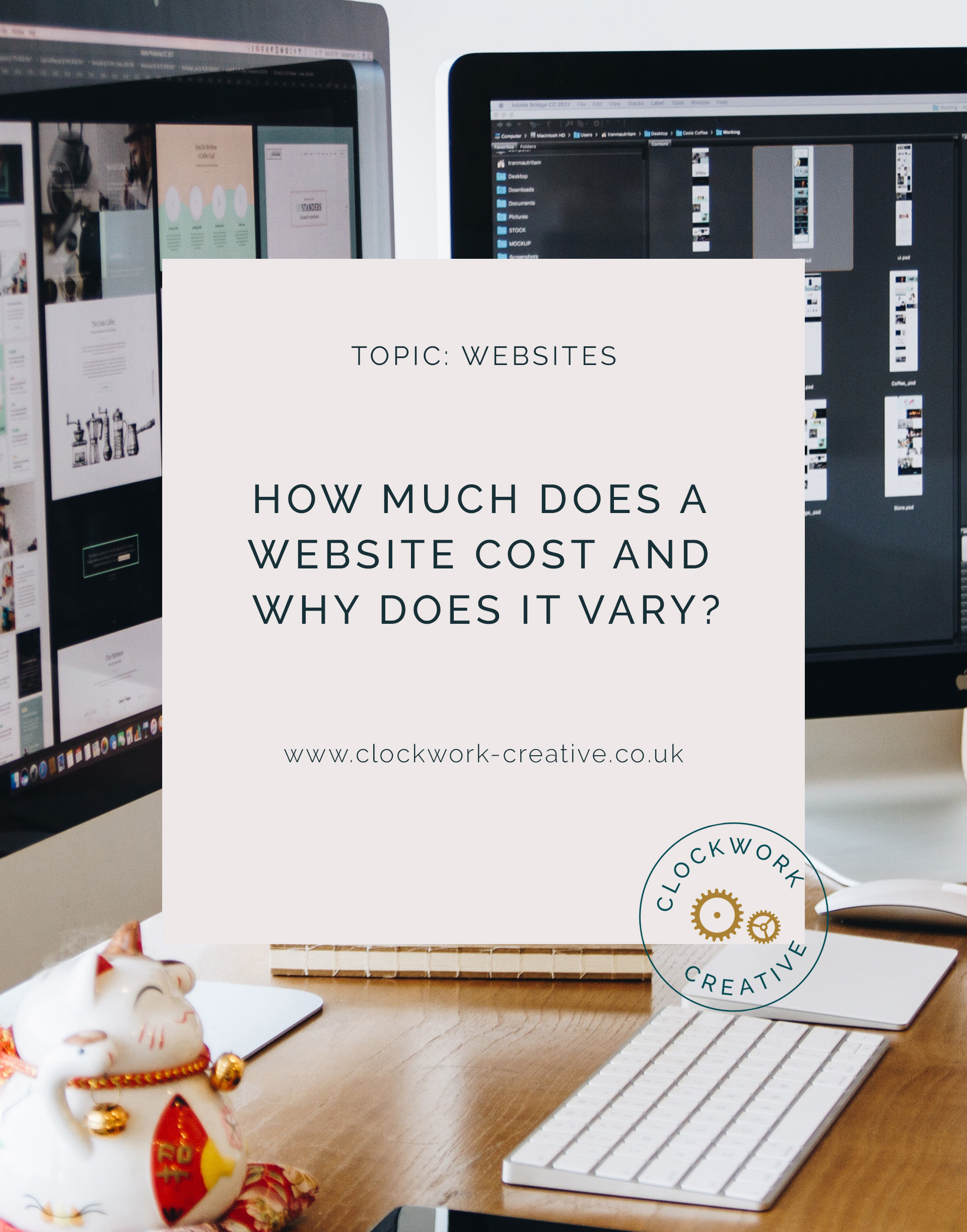Just like any product or service, prices can vary for what is fundamentally the same thing. They can range from being free to build with ongoing costs of only a few pounds a month, to costing £30k upwards to build and cost thousands for ongoing development and maintenance.
You can buy a handbag in Primark for a fiver but a Micheal Kors handbag can set you back £250, or you could even spend in the region of £1,500 for a Gucci one. It’s widely accepted that the style, product and service quality, brand name, production method, warranty etc are just a handful of reasons for the price difference. However with a lot of creative trades, like my business, or makeup artists, or cake bakers (to name a few), the range in price tends to be queried. Whereas for most other products, like handbags, it’s just understood and accepted that the price can vary depending on a number of factors.
Think about the reason why you choose to purchase one product over another. Using the handbag example, even though it’s effectively the same product, the decision to spend £5 or £250 is ultimately down to what you want from a handbag. Do you just need it to fulfil its basic function or do you want something really well made and beautiful? Do you want one to last you years or something cheap and cheerful and it doesn’t matter if the strap breaks after a few months? I think you can see where I’m going with this!
The reason you might not always go for the lowest cost option when making a purchase is usually down to what you want from a product or service. What you want it to look like, your budget, what you feel to be good value, how you want others to perceive you etc, are all factors that impact your purchase decision.

different website options
They all have a place in the market and which option is best for you and your business, depends on what you’re looking to achieve from the website, your technical skills, website complexity, desired customer perception etc. Now, you may be thinking I missed one of the biggest factors, available budget! I understand investment and cash flow for startups and small businesses can be a challenge, and if being free is the most important thing to you then a DIY website is a great option… but you may have to be realistic in terms of what a free/DIY/inexpensive website can achieve. To help you determine the best website option for your business, I’m sharing my experience of DIY website platforms, and what different web professionals, studios or agencies might offer that can vary pricing so drastically.
DIY WEBSITE PLATFORMS
Building a DIY website with someone like Wix, GoDaddy or SquareSpace can be free or relatively inexpensive compared to hiring a professional or agency. However there are some limitations and downsides, otherwise we’d all be doing it!
Although a DIY website might be free, it’s often a pretty basic website design template and may not include use of your own domain. Some free platforms also place unwanted adverts on your site and have minimal SEO optimisation or analytics integration.
The website builder interface may be easy(ish) to use without any technical or HTML skills. On the flip side, the customisation options are usually limited and in some cases you can’t brand the website with your identity other than just a logo. The templates included are also widely used so your website may look like a lot of others and not stand out amongst your competitors.
Hosting is usually included with a DIY platform, so the great news is you don’t have to understand or organise it! However, it is usually bottom of the barrel hosting, it can be unreliable with no SLAs or protection from downtime and has little or no security against online threats.
Another benefit of this option is that as you can build and update your website yourself, you don’t have to work to someone else’s schedule or availability. However, the thing to keep in mind is that even if the interface is easy to use, websites can be very time consuming to create so you have to allow yourself time to build the website and keep it up to date.
I will caveat that all of the above can vary depending on which DIY website platform you use, and not all were made equal, for instance I’ve found SquareSpace miles better than other DIY website platforms. Although it’s not the cheapest DIY option, it has good support and you can create a really professional looking website if you have an eye for good design, and time to invest in creating your site.

USING A PROFESSIONAL
If a DIY website isn’t for you and you’d like to engage a website professional, studio or agency, choosing the right one for you still comes with a number of decision making factors. Chances are the more you want from your site, the more experienced the professional or agency and the higher the level of support and SLAs, the more you’re likely to pay.
Lower end price range – You can easily get a developer or online designer via a freelance platform to build you a 6-8 page brochureware (basic information, like an online brochure) website for around £500 and where hosting is only a few pounds a month. The likelihood is for this you will get a relatively basic website with minimal design features and sketchy hosting, but it will be customised with your company branding, imagery and content. You need to supply the requirements like what pages you want, supply the content, images and branding you want on the website and they’ll build it for you. You’ll probably get a half decent website that looks professional and serves its basic function (to host information online). This type of website is great for startups that have a limited budget, who just want a simple but credible website, and know exactly what they want.
Mid to higher end price range – If you want more than just a small basic website you may want to consider a professional that offers a broader website service, or even a creative studio or full service agency. The price you’re quoted will be based on the website size and complexity, bespoke design requirements and additional help and support you require. For example, if you want advice on SEO, help with creating a wider online presence, and how to drive traffic to your website; and/or understanding your website visitors, analyse their behaviour and convert visitors to enquires/sales, then this will increase the costs. You will also need to consider hosting, updates and maintenance and if you want this to be completely hassle free. Having a specialist manage this on your behalf can ensure your website is regularly backed up, has the latest technology updates and is protected from new online threats but you’re likely to pay upwards of £50 per month.
It’s basically the age old saying that of “you get what you pay for”. On the rare occasion you might get a bargain and it could be a talented junior designer starting out while they build a portfolio. However you usually find that a higher cost professional, studio or agency adds an immense amount of value by offering a much broader service than just building you a simple website.
Note: A higher price doesn’t automatically guarantee a higher service quality or a better end result. Make sure you understand exactly what is being offered within the quoted cost, do your research on the professional or company you plan to use and check out their client credentials.
CONCLUSION
I hope this round up has helped your understanding of the different website options and why they can vary so much in cost.
DIY website platforms are a great tool if you’re tech savvy and interested in web design, and they also allow for a relatively easy website launch at little to no cost. But they do require a time investment from you and you could run into some problems on the way or might not end up with a website of your dreams!
If you’re looking for more than what a DIY website offers and want to consider using a professional, you need to define what you want your website to achieve and what support, advice or guarantees you might want from the professional or company creating your site. This will determine the level of investment you need to consider to achieve your website goals and meet your expectations.
Every business is different and given the number of decision making factors there is no right answer, it’s about what is right for you and your business.






